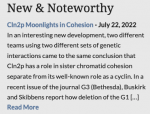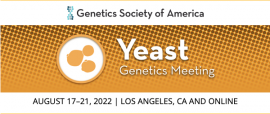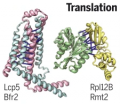Difference between revisions of "SGD Newsletter, Summer 2022"
(→Congratulations to Jeremy Thorner) |
(→microPublications enter log phase) |
||
| (96 intermediate revisions by 3 users not shown) | |||
| Line 1: | Line 1: | ||
[[Category: Newsletter]] | [[Category: Newsletter]] | ||
| − | '''About this newsletter:''' <br> This is the Summer 2022 issue of the SGD newsletter. The goal of this newsletter is to inform our users about new features in SGD and to foster communication within the yeast community. You can view this [https://wiki.yeastgenome.org/index.php/SGD_Newsletter, | + | '''About this newsletter:''' <br> This is the Summer 2022 issue of the SGD newsletter. The goal of this newsletter is to inform our users about new features in SGD and to foster communication within the yeast community. You can view this [https://wiki.yeastgenome.org/index.php/SGD_Newsletter,_Summer_2022 newsletter] as well as previous newsletters on our [https://wiki.yeastgenome.org/index.php/SGD_Newsletter_Archives Community Wiki]. |
==Performance updates at SGD== | ==Performance updates at SGD== | ||
[[Image:sgd_maintenanceguy.jpeg |thumb|left|upright=.5]] | [[Image:sgd_maintenanceguy.jpeg |thumb|left|upright=.5]] | ||
| − | Thousands of SGD users run their data against SGD data every day and this can put a heavy load on servers. To improve performance, we have invested in dockerizing our full database so that loads can be better distributed in real time. We are currently at the stage of testing the | + | Thousands of SGD users run their data against SGD data every day and this can put a heavy load on servers. To improve performance, we have invested in dockerizing our full database so that loads can be better distributed in real time. We are currently at the stage of testing the frontend of our software to look for bugs, which we do for every update. The next phase will entail dockerizing and testing the backend, so we can improve our data uploads. |
| − | |||
| − | |||
| + | We hope to see improved performance for you, our users. If you happen to notice faster speeds or fewer hiccups…we’d be quite glad to hear about it! (A message to the SGD Helpdesk reaches us all.) | ||
| + | <br><br><br><br> | ||
==Research Spotlights are back== | ==Research Spotlights are back== | ||
[[Image:ResearchSpotlight_2022-07-26_at_9.32.28_AM.png|link=https://www.yeastgenome.org/ |thumb|left|upright=.5]] | [[Image:ResearchSpotlight_2022-07-26_at_9.32.28_AM.png|link=https://www.yeastgenome.org/ |thumb|left|upright=.5]] | ||
| − | + | SGD triages all the papers that come out each week to find those that add value to our database. In the process, we are continually impressed by the quality of the research done in yeast and we decided it was time to bring back the “Research Spotlight” as a post that appears on the SGD home page in the "New and Noteworthy" section. | |
| − | The goal is to highlight interesting new work that either continues an ongoing story, makes a twist in the story we all thought we knew (such as an unexpected side gig for a protein), or offers a new technique or perspective for mining the most value from the yeast model. | + | The goal is to highlight interesting new work that either continues an ongoing story, makes a twist in the story we all thought we knew (such as an unexpected side gig for a protein), or offers a new technique or perspective for mining the most value from the yeast model. There are numerous intriguing papers in yeast, including those shedding light on human disease by dissecting the cellular biology in yeast, using our remarkable tools, so as to identify new targets or drugs for humans. |
As the model organism databases move toward forming the Alliance of Genome Resources, which will streamline and integrate our combined data, we expect this power to make useful connections will only grow. | As the model organism databases move toward forming the Alliance of Genome Resources, which will streamline and integrate our combined data, we expect this power to make useful connections will only grow. | ||
| + | <br><br> | ||
| − | ==Upcoming Yeast Genetics Meeting | + | ==Upcoming Yeast Genetics Meeting== |
| − | [[image:YGM2022.png | link=https://genetics-gsa.org/yeast-2022/|thumb|left|upright=. | + | [[image:YGM2022.png | link=https://genetics-gsa.org/yeast-2022/|thumb|left|upright=.9]] |
| − | We may have forgotten how to talk to other people ''in person'', but the Yeast Genetics Meeting is going to give us a chance to practice. The meeting will be held in person for the first time in four years at UCLA, from August 17-21. We hope to see you there! | + | We may have forgotten how to talk to other people ''in person'', but the [https://genetics-gsa.org/yeast-2022/ Yeast Genetics Meeting] is going to give us a chance to practice. The meeting will be held in person for the first time in four years at UCLA, from August 17-21. We hope to see you there! |
Of course, it being the COVID era, you can also register to attend virtually, and the cost will not be higher for late registration. | Of course, it being the COVID era, you can also register to attend virtually, and the cost will not be higher for late registration. | ||
| − | A big congratulations to the award recipients who are the invited speakers for 2022. Tom Petes is receiving the YGM Lifetime Achievement Award, Trisha Davis is giving the Winge-Lindegren Address, Maya Schuldiner is receiving the Ira Herskowitz Award, and Michael Desai is giving the Lee Hartwell Lecture. Learn more about these researchers and their work at the YGM website. | + | |
| + | A big congratulations to the award recipients who are the [https://genetics-gsa.org/yeast-2022/invited-speakers/ invited speakers] for 2022. Tom Petes is receiving the YGM Lifetime Achievement Award, Trisha Davis is giving the Winge-Lindegren Address, Maya Schuldiner is receiving the Ira Herskowitz Award, and Michael Desai is giving the Lee Hartwell Lecture. Learn more about these researchers and their work at the YGM website. | ||
| + | <br><br> | ||
==Congratulations to Jeremy Thorner== | ==Congratulations to Jeremy Thorner== | ||
| − | [[JeremyThorner.png |thumb|left|upright=. | + | [[image:JeremyThorner.png |thumb|left|upright=.3]] |
| + | |||
| + | |||
| + | |||
| + | While on the subject of congratulations, a past recipient of the YGM Lifetime Achievement Award and a longtime friend and advisor of SGD has been further honored with a full issue of the journal ''Biomolecules'' dedicated to his work, [https://www.mdpi.com/journal/biomolecules/special_issues/Jeremy_Thorner Transmembrane and Intracellular Signal Transduction Mechanisms: A Themed Issue in Honor of Professor Jeremy Thorner] | ||
| − | |||
We are grateful to have Dr. Thorner’s work integrated into the SGD database and into our wider community’s ongoing mission to understand yeast. | We are grateful to have Dr. Thorner’s work integrated into the SGD database and into our wider community’s ongoing mission to understand yeast. | ||
| + | <br><br> | ||
| − | ==SGD collaborates | + | ==SGD collaborates to add new data links== |
| − | [ | + | [[Image:AlphaFoldPrediction.png|thumb|right|upright=.4]] |
| − | On | + | On the topic of integration, SGD is happy to integrate new data sets that add value to the database. We have the ability to incorporate these datasets directly from research groups, rather than from publications. Most recently we integrated the [http://www.science.org/doi/10.1126/science.abm4805 AlphaFold] predicted 3D structures for complexes as links on the SGD Interaction and Protein pages. It is now possible to look for your own proteins or complexes of interest and go straight to the predicted structure. |
| + | |||
| + | Another recent example is [https://www.weizmann.ac.il/molgen/AnalogYeast AnalogYeast], a dataset of analogs to yeast proteins in non-fungal organisms predicted by sequence similarity, which was created by the [https://mayaschuldiner.wixsite.com/schuldinerlab Schuldiner lab]. Links have been added to the Resources sections of SGD [https://yeastgenome.org/locus/S000005737/protein#resources Protein] and [https://yeastgenome.org/locus/S000005737/homology#resources Homology] pages. | ||
We are open to more of this collaboration and would be glad to hear from community members who think they have data useful to other researchers. Get in touch! | We are open to more of this collaboration and would be glad to hear from community members who think they have data useful to other researchers. Get in touch! | ||
| − | == | + | ==microPublications enter log phase== |
| + | [[Image:MicroPub.png|link=https://www.micropublication.org/|thumb|right|upright=.4]] | ||
| + | |||
| + | microPublication is part of the emerging genre of rapidly-published research communications. We are seeing a strong set of microPublications come through the database and are glad for this venue to publish brief, novel findings, negative and/or reproduced results, and results which may lack a broader scientific narrative. Each article is peer-reviewed, assigned a DOI, and indexed through PubMed and PubMedCentral. | ||
| − | |||
| − | https://www.micropublication.org | + | Consider [https://www.micropublication.org/journals/biology/species/s-cerevisiae microPubublications] when you have a result that doesn't necessarily fit into a larger story, but will be of value to others. |
| − | |||
| − | == | + | You can find a list of recent yeast microPublications on the [https://www.yeastgenome.org/search?category=reference&journal=microPublication.%20Biology&page=0&q= SGD website]. |
| − | |||
| − | |||
| − | ==Alliance of Genome Resources - | + | ==Alliance of Genome Resources - Release 5.2== |
[[Image:alliance_logo.png|link=https://www.alliancegenome.org/ |thumb|left|upright=.5]] | [[Image:alliance_logo.png|link=https://www.alliancegenome.org/ |thumb|left|upright=.5]] | ||
| − | The [https://www.alliancegenome.org/ Alliance of Genome Resources], a collaborative effort from SGD and other model organism databases (MOD), released [https://www.alliancegenome.org/release-notes version | + | The [https://www.alliancegenome.org/ Alliance of Genome Resources], a collaborative effort from SGD and other model organism databases (MOD), released [https://www.alliancegenome.org/release-notes version 5.2] this past May. |
| − | + | ||
| + | *The Alliance is now using the latest version of the DRSC Integrative Ortholog Prediction Tool (DIOPT): Version 9. This version includes a data refresh from all orthology sources, the addition of the SonicParanoid algorithm, and the removal of both TreeFam and RoundUp data sources. | ||
| + | |||
| + | *Much of this release focused on backend enhancements, particularly the continued efforts to develop software to provide a single interface for Alliance curators from all the Model Organism Databases (MODs). This single interface will reduce software development redundancies and free up resources for new features. Future releases will continue to add more modules for entering different data types. | ||
==Upcoming Conferences and Courses== | ==Upcoming Conferences and Courses== | ||
| − | + | *[https://meetings.cshl.edu/courses.aspx?course=C-YEAS&year=22 Yeast Genetics & Genomics] - modern and intensive laboratory course that teaches students the full repertoire of genetic and genomic approaches needed to dissect complex problems using the yeast ''Saccharomyces cerevisiae'' | |
**Cold Spring Harbor Laboratory, NY | **Cold Spring Harbor Laboratory, NY | ||
**July 26 - August 15, 2022 | **July 26 - August 15, 2022 | ||
| Line 66: | Line 77: | ||
**University of California, Los Angeles | **University of California, Los Angeles | ||
**August 17 – 21, 2022 | **August 17 – 21, 2022 | ||
| − | + | *Gene Ontology Consortium Fall Meeting | |
| − | + | **Virtual plus in person | |
| − | + | **California Institute of Technology, Pasadena | |
| − | + | **October 11 – 13, 2022 | |
| − | + | *Fungal Pathogen Genomics - Hands-on training in web-based data-mining resources for fungal genomes | |
| − | + | **Wellcome Genome Campus, Hinxton, Cambridge, UK | |
| − | + | **May 07 to May 12, 2023 | |
| − | |||
| − | |||
| − | |||
| − | |||
| − | |||
| − | |||
| − | |||
| − | |||
| − | |||
| − | |||
| − | |||
| − | |||
Latest revision as of 11:16, 28 July 2022
About this newsletter:
This is the Summer 2022 issue of the SGD newsletter. The goal of this newsletter is to inform our users about new features in SGD and to foster communication within the yeast community. You can view this newsletter as well as previous newsletters on our Community Wiki.
Contents
Performance updates at SGD
Thousands of SGD users run their data against SGD data every day and this can put a heavy load on servers. To improve performance, we have invested in dockerizing our full database so that loads can be better distributed in real time. We are currently at the stage of testing the frontend of our software to look for bugs, which we do for every update. The next phase will entail dockerizing and testing the backend, so we can improve our data uploads.
We hope to see improved performance for you, our users. If you happen to notice faster speeds or fewer hiccups…we’d be quite glad to hear about it! (A message to the SGD Helpdesk reaches us all.)
Research Spotlights are back
SGD triages all the papers that come out each week to find those that add value to our database. In the process, we are continually impressed by the quality of the research done in yeast and we decided it was time to bring back the “Research Spotlight” as a post that appears on the SGD home page in the "New and Noteworthy" section.
The goal is to highlight interesting new work that either continues an ongoing story, makes a twist in the story we all thought we knew (such as an unexpected side gig for a protein), or offers a new technique or perspective for mining the most value from the yeast model. There are numerous intriguing papers in yeast, including those shedding light on human disease by dissecting the cellular biology in yeast, using our remarkable tools, so as to identify new targets or drugs for humans.
As the model organism databases move toward forming the Alliance of Genome Resources, which will streamline and integrate our combined data, we expect this power to make useful connections will only grow.
Upcoming Yeast Genetics Meeting
We may have forgotten how to talk to other people in person, but the Yeast Genetics Meeting is going to give us a chance to practice. The meeting will be held in person for the first time in four years at UCLA, from August 17-21. We hope to see you there!
Of course, it being the COVID era, you can also register to attend virtually, and the cost will not be higher for late registration.
A big congratulations to the award recipients who are the invited speakers for 2022. Tom Petes is receiving the YGM Lifetime Achievement Award, Trisha Davis is giving the Winge-Lindegren Address, Maya Schuldiner is receiving the Ira Herskowitz Award, and Michael Desai is giving the Lee Hartwell Lecture. Learn more about these researchers and their work at the YGM website.
Congratulations to Jeremy Thorner
While on the subject of congratulations, a past recipient of the YGM Lifetime Achievement Award and a longtime friend and advisor of SGD has been further honored with a full issue of the journal Biomolecules dedicated to his work, Transmembrane and Intracellular Signal Transduction Mechanisms: A Themed Issue in Honor of Professor Jeremy Thorner
We are grateful to have Dr. Thorner’s work integrated into the SGD database and into our wider community’s ongoing mission to understand yeast.
SGD collaborates to add new data links
On the topic of integration, SGD is happy to integrate new data sets that add value to the database. We have the ability to incorporate these datasets directly from research groups, rather than from publications. Most recently we integrated the AlphaFold predicted 3D structures for complexes as links on the SGD Interaction and Protein pages. It is now possible to look for your own proteins or complexes of interest and go straight to the predicted structure.
Another recent example is AnalogYeast, a dataset of analogs to yeast proteins in non-fungal organisms predicted by sequence similarity, which was created by the Schuldiner lab. Links have been added to the Resources sections of SGD Protein and Homology pages.
We are open to more of this collaboration and would be glad to hear from community members who think they have data useful to other researchers. Get in touch!
microPublications enter log phase
microPublication is part of the emerging genre of rapidly-published research communications. We are seeing a strong set of microPublications come through the database and are glad for this venue to publish brief, novel findings, negative and/or reproduced results, and results which may lack a broader scientific narrative. Each article is peer-reviewed, assigned a DOI, and indexed through PubMed and PubMedCentral.
Consider microPubublications when you have a result that doesn't necessarily fit into a larger story, but will be of value to others.
You can find a list of recent yeast microPublications on the SGD website.
Alliance of Genome Resources - Release 5.2
The Alliance of Genome Resources, a collaborative effort from SGD and other model organism databases (MOD), released version 5.2 this past May.
- The Alliance is now using the latest version of the DRSC Integrative Ortholog Prediction Tool (DIOPT): Version 9. This version includes a data refresh from all orthology sources, the addition of the SonicParanoid algorithm, and the removal of both TreeFam and RoundUp data sources.
- Much of this release focused on backend enhancements, particularly the continued efforts to develop software to provide a single interface for Alliance curators from all the Model Organism Databases (MODs). This single interface will reduce software development redundancies and free up resources for new features. Future releases will continue to add more modules for entering different data types.
Upcoming Conferences and Courses
- Yeast Genetics & Genomics - modern and intensive laboratory course that teaches students the full repertoire of genetic and genomic approaches needed to dissect complex problems using the yeast Saccharomyces cerevisiae
- Cold Spring Harbor Laboratory, NY
- July 26 - August 15, 2022
- Yeast Genetics Meeting - the premier meeting for students, postdoctoral scholars, research staff, and principal investigators studying various aspects of eukaryotic biology in yeast
- University of California, Los Angeles
- August 17 – 21, 2022
- Gene Ontology Consortium Fall Meeting
- Virtual plus in person
- California Institute of Technology, Pasadena
- October 11 – 13, 2022
- Fungal Pathogen Genomics - Hands-on training in web-based data-mining resources for fungal genomes
- Wellcome Genome Campus, Hinxton, Cambridge, UK
- May 07 to May 12, 2023






